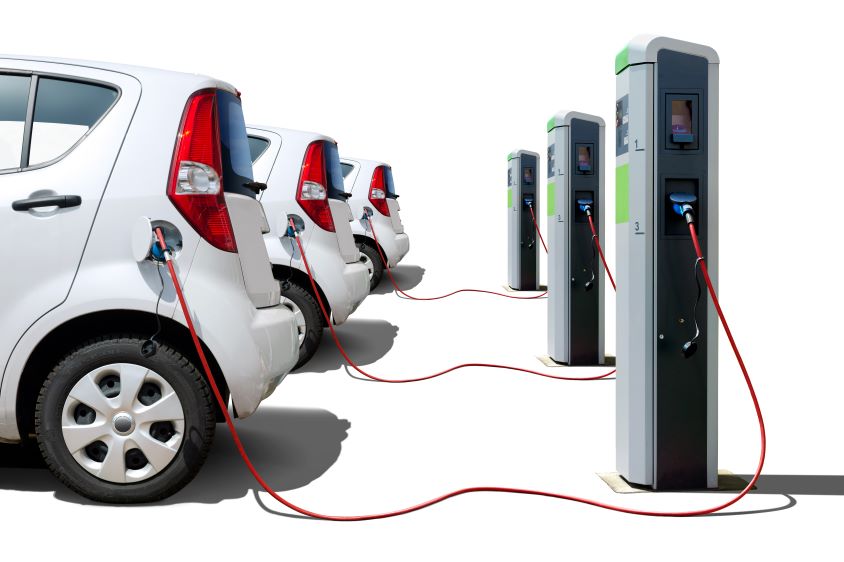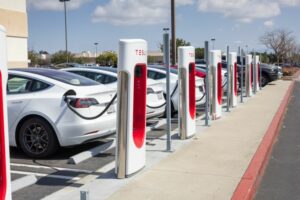The cost of electric cars for UK fleets
Written by: Simon Pavey, Last updated:13th February 2023

A common myth surrounding electric vehicle fleets is that they will cost your business more than fossil fuel burning vehicles. This is the main reason why 50% of fleet managers are cautious about making the switch.
However, when we break down the cost of electric vehicle fleets, it becomes clear that this caution is not completely justified.
What is the true cost of operating electric vehicles?
The ‘on-the-road price’ is a term commonly used to describe the true cost of an electric vehicle. This comprises not only the list price, but also the cost of other factors such as fuel, insurance, and road tax. Essentially, it’s the real-world cost of buying the vehicle and being able to legally drive it, which is always higher than the list price of an individual vehicle.
Whilst it’s true that the initial cost of purchasing an electric vehicle could be steeper than buying a new diesel vehicle, this shouldn’t put fleet managers off. Once you’re managing electric vehicle fleets, you’ll realise the extra cost was worth it in the long run.
Let’s break down the key costs associated with electric fleet vehicles. While there are a range of different vehicles available in market today based on engine-size, carrying capacity, and business purpose, we’ll use a Citroen C4 as an example to illustrate costs.
The cost of purchasing an electric car in the UK
Based on 2021 data, the diesel version of a Citroen C4 has an on-the-road price of £26,040.
This vehicle’s electric counterpart, the e-C4, has an on the road price of £29,680.
Consequently, the EV model costs around 12% more than a diesel counterpart, which in turn is likely to cost slightly more than a petrol equivalent.
Typically, electric cars tend to RRP from around £28,000 – with no cap as of yet and some lower-priced exceptions to the rule.
The cost per mile of an electric car
You’ll find the cost per mile of an electric car will vary depending on the make and model of the vehicles and generally a better measurement of cost for EV journeys is taken at the charge point.
Mile per kilowatt-hour (MPkWh) is the amount of miles you’ll get from an hour of charge. Similar to a petrol or diesel vehicle, the more charge or “fuel” your electric car can hold then the further it can take you. Like the cost of miles to the gallon of fuel, MPkWh price will vary depending on where you fill up.
How much does it cost to charge an electric car?
Different recharge points may have different costs, much like how different petrol stations will have varying prices for traditional fuel, and charging at home is cheaper than public charging.
For the average EV with a 60kWh battery and a range of 200 miles, you’ll find that charging at home will cost approximately £15 for a full charge, and charging at charge points at petrol stations typically cost around the £20-25 mark for a full charge.
Often places like supermarkets and other public locations such as car parks offer charging that is free to use. If you are looking to save money on trips, locating these free charging points can help.
Electric car charging installation cost
If you have off street parking then installing a charging point at home is essential if you are making the switch to EV, and for businesses wanting to invest in sustainable infrastructure then charging points are a great idea.
Many companies will combine the cost of a charging and the cost of installing it, so this is important to know when picking your provider. For both home charging points and business charging points there are government grants available in the UK to help cover a chunk of the costs.
For businesses wanting to make EV charging more accessible on work premises or looking to grow their EV fleets, read more about the Workplace Charging Scheme here.
The cost of an electric car battery
Unfortunately, electric car batteries are very costly with the cheaper ones priced at around £1500 and the most expensive ones priced at around £10,500. The cost of a replacement EV battery will of course depend on the make and model of vehicle. This cost also doesn’t include installation costs.
These batteries are so expensive because of high demand but only a small amount of availability. 6 companies produced 85% of the lithium-ion batteries used in electric cars in the latter half of 2020.
Cost of running a petrol car versus an electric car in the UK
Let’s look at the Citroen C4 as an example.
The diesel version has an on-the-road price of £26,040.
This vehicle’s electric counterpart, the e-C4, has an on the road price of £29,680.
This initial extra cost of over £3,000 per vehicle is what makes fleet managers shake their heads. After all, when purchasing multiple of these electric vehicles, the extra cost of constructing your fleet could seriously add up.
The total cost ownership of electric vehicle fleets
However, once you’ve got your electric vehicles on the road, you’re going to start saving. Let’s look at the Citroen C4 example again.
Assuming the cost of diesel is 126.5p per litre (an average UK Price in March 2021), it would cost £2.85 each day for a 25 mile journey. Over a year, this journey would cost £1,040.
The cost of doing the same daily journey in the electric C4 is proof that cost of running electric vehicles is not something fleet managers should be worried about. The daily cost of the 25 mile journey would be £1.10. Over the year, that journey would cost £402.
That’s a saving of £638 per year, just by using electric instead of diesel.
Since electric vehicles do not emit harmful CO2, they are exempt from road tax. This small saving will also add up over time.
The more mileage your electric vehicles do, the more extreme the savings can be. Having 3 Citroen e-C4s in your fleet doing 50 miles a day for 3 years will completely negate the extra cost of the initial purchase of these vehicles, just from savings on fuel costs.
Of course, the costs will vary depending on which vehicles you use, but the e-C4 is a perfect example of the types of savings you could be benefitting from.
Government grants making EV purchasing easier
The UK government also offers a grant to assist in the purchase of low emissions vehicles.
This is part of the government’s 10-point plan for a “green industrial revolution”, which includes the 2030 ban on the production and sale of new petrol and diesel vehicles.
The percentage of the grant offered depends on the vehicle. For cars, the grant will pay for 35% of the overall price up to a maximum of £2,500. The car must cost less than £35,000 for it to be eligible.
For large vans, the grant will pay for 35% of the overall price up to a maximum of £6,000.
It’s unlikely the government will offer these grants forever, so it might be worth considering making the transition to EVs now whilst they are still available.
How else can I save money with electric vehicles?
If you are running fleets of electric vehicles, you should be using a fuel card to optimise the benefits. With the right card, you could see cheaper charging costs and more convenience in terms of where you can charge your vehicles. Many fuel cards offer competitive prices on both electric and fuel, meaning you can slowly make the transition to keep up with the industry-wide switch to low emission vehicles.
To find out more about how a fuel card can help you, get in touch with our expert team. They’ll find the best option for your fleet.
back




